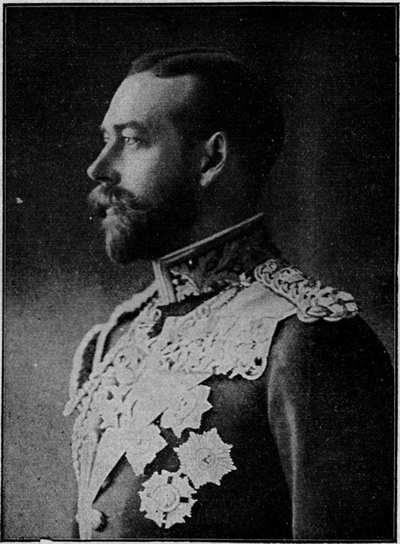Royal Nativities - Astrological Studies by Elsbeth Ebertin reveals astrological insights about King George V as well as contemporary world leaders Tsar Nicholas II and Grand Duke Nicholas Nikolaevich. Originally published in 1915, this rare book is now translated from the original German by Jennifer Zahrt and republished by Revelore Press. Elsbeth Ebertin was the mother of famed astrologer Rheinhold Ebertin (pioneer of astrological midpoints) and an excellent astrologer in her own right, made clear in this excerpt of her book.
Prophecies about King George V.
Several astrologers have already spoken out in unanimous terms about the current King of England. The first prophecies have come true in an astonishing way, even though initially they were considered to be unlikely and unbelievable, so that at first they provoked the mockery and ridicule of those circles who still have no idea about the accuracy of astronomical-astrological calculations.
When George V was barely three years old, important statements about his future destiny became known. As is well known, his oldest brother, Prince Albert Victor, who was born a full year before him, held the privilege to a triple crown, while from birth the current King of England still had no prospect of accession to the throne.
In 1868, however, the astrologer A. J. Pearce prophesied to the young prince, that he would one day become King of England under the name of George V. Because George’s father was only 27 at the time, the prophecy attracted a lot of attention on the one hand, while on the other, people smiled about it.
Those who are familiar with astrological rules and who take a look at the nativity of the first born, will easily find out that this prince could only be given a few decades; for during his birth on January 8, 1864 the luminaries, the Sun and Moon, were conjunct, the Sun at 17° Capricorn in an exact square to Saturn at 17° Libra. This mutual aspect: Sun square Saturn had to have a decisive effect someday. Thus Albert Victor died as a young man in his 29th year—as Saturn had completed its cycle through the 12 zodiac signs for the first time and stood in the sign of Libra again. He died in 1892, after having been appointed the Duke of Clarence two years prior and gotten engaged to Princess Mary von Teck. Now George inherited the right of succession and at the same time acquired the bride of his deceased brother.
The old prophecy was thus fulfilled exactly; because on May 6, 1910, George V ascended to the English throne.
If we look at the Nativity of the King of England, we will come to quite astonishing results.
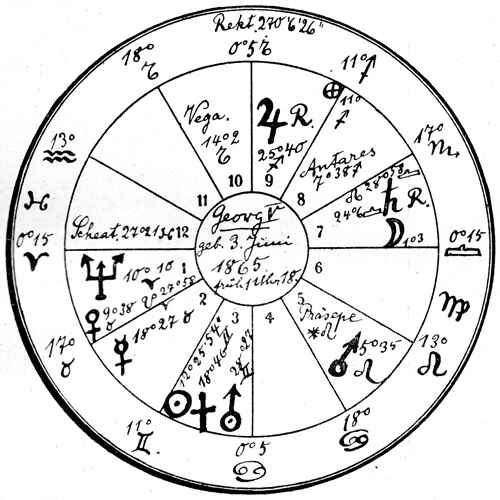
We see that during his birth the Sun was in the 3rd house of the horoscope, which as is well known refers to siblings, relatives, and trips, and that the sensitive point for sickness and death (†) was conjunct the Sun. From this one can at first conclude that the native had to attain honor and ascent through the death of a brother. At the same time the sensitive point for sickness and death in this position—in the 3rd house—should someday bring the native sickness due to travel and danger of death during the same. (See the Astrological Library from Karl Brandler-Pracht, Vol 2, page 154). Concerning this signification, English astrologers have already said that King George V would die a sudden death like his brother, and that his government would face serious disasters on land and sea. The prophecies have already been repeated soon after he took office:
- Through the terrible catastrophe of the “Titanic.”
- Through the sinking of the ship that was to bring the coronation materials to India.
- Through the many great losses of ships in the current war.
For the marriage to his brother’s bride, the 7th house, which relates to love and marriage, shows us a fitting picture through the configuration of the Moon in Libra (the house of Venus) and through Saturn, the ruler of the 10th house, which refers to rank, offices, and dignities and so on.
If we conduct an interpretation of the nativity according to sequence, then the sign of Aries comes into consideration as the basis of his fate and for his character. The ruler of the horoscope is Mars, which stands in the royal sign of Leo in the nativity.
According to the entries in the Astrological Library those influenced by Aries, that is when the ascendant is in this sign, are especially: executive, serious, and determined. They like to lead and dominate, are extremely ambitious, aggressive, witty, brilliant, funny, very boastful, but good company, and also very intuitive.
Since during George V’s birth, Neptune was in the sign of Aries, in the first house of the horoscope, which gives information about his character, the aforementioned qualities are somewhat clouded and in part—through the opposition with the Moon (Neptune opposing Moon)—significantly altered. Most notably, Neptune in Aries produces an unusually strong imagination and complacency, but also a lively imaginativeness, an astute mind, and love of change.
The person born under these influences will always be full of plans that are frequently not implemented.
A further theorem about those influenced by Aries states: “The person subject to the sign Aries knows how to help themselves in most every situation in life; they place great confidence in their skill and ability. They will experience luck through an adventure or a particular event (in this case through the death of his brother, elevation to King). The misfortunes in their life usually arise from their impetuous, rash, usually entirely ill-considered, impulsive judgments and actions.”
(I am quoting these sentences verbatim from the Astrological Library so that I cannot be accused of having intentionally judged the character of the King of England in a negative sense, or painted a darker picture of him, than he is—for I proceed from the point of view, that one should also do justice even to the hostile forces. I do not want to repay like with like, even though the English astronomers have greatly darkened the image of our emperor since war broke out, no longer sticking to pure science.)
About the significance of Neptune in a rising sign, very accurate remarks are in Zodiakus (1910, p 143). Here simply the following:
“…All phenomena of the sea emanate from him: he sends storms and levels the tide; he angrily pushes his trident, this terrible weapon, into the sea, so that the waves roar, so that they devour ships, flood the lands and bury cities in their bosom… Neptune was the God of the Waters according to ancient signification.”
Because this planet dominated the rising sign during the birth of the King of England, the karmic fate of George V is inextricably linked with the ruler of the sea, and it is easily understandable that England’s significant naval power became famous. Only one cannot disregard the hostile countercurrent of Neptune in opposition to the Moon, the ruler of the sign of Cancer (which is the rising sign of the German Emperor).
Neptune in opposition to the Moon occasionally causes vulnerable defeats and losses in the British navy and merchant marine through hostile forces, like for example through our German cruisers and submarines.
The comparison of the King’s horoscopes thus presents a very fitting illustration that one need not be surprised at the arrival of earlier prophecies.
Further astrological rules about the configuration of Neptune in the first house read: Whoever is dominated by the influence of Neptune possesses the trait of judging from their moods, however, when the planet is poorly aspected (Neptune opposing Moon), also has erroneous ideas and opinions. The planet Neptune otherwise influences the thoughts to the pressure of wanting to be recognized by the world, gives a tendency to theology and Theosophy, etc.—It is well known that George V, King of the United Kingdom of Great Britain and Ireland and the overseas British possessions, defender of the faith and Emperor of India—the teachings of Theosophy, the comparative philosophy of religion, are especially widespread in his countries.
Externally Neptune in connection with Venus makes one beautiful and gives the person a unique magic, as one often finds with artists. If Neptune is corrupted—like for example in the above nativity in opposition with the Moon—it causes, despite the brilliant exterior (according to the explanations in Zodiakus), a tendency toward shallowness, disguise, hypocrisy, unconscious or conscious fraud, a predisposition for all sorts of intrigues, and deceit.
If Neptune opposes the Moon, it produces a nervous irritability, inner unrest, emotional depression, or mood disturbances… (It is certainly not easy for the King of England, even he will have too much to suffer through his karmic destiny.)
The ruling planet of George V is Mars, which stood in the 5th house of his nativity in the royal sign of Leo during his birth. If the luminaries are afflicted, Mars in the 5th place causes some of his children to die from accidents or great misfortune. (See Astrological Library, Volume 2, page 120).
According to the position of Mars, the King himself will have an excessive tendency to gamble, to bet or speculate, and also loves excessive pleasures and distractions of all kinds—however, during wartime, his desire should vanish somewhat.
Mars in Leo in conjunction with the evil fixed star Praesepe will also cause violent family fates. Because Mars is the ruler of the 1st and 8th houses, the latter provides information about the manner of death, so the prophecy that the King will suffer a very sudden, entirely unexpected death will hold true.
If we compare the current celestial constellations with the natal horoscope of the King of England, we find that for weeks now Saturn has been at 25° Gemini, only a few degrees away from Uranus in his natal chart, however in exact opposition to Jupiter at 25° Sagittarius in the 9th house, which refers to great journeys, shipping and colonial affairs, and disturbances in foreign connections in a royal horoscope. According to the explanations in the Astrological Library such a transit of Saturn in opposition to natal Jupiter brings a typical mortal: loss in court, difficulties in judicial affairs, loss of honor, or business failures—naturally corresponding to his office or profession. Because we are dealing with a nativity of a King and the evil astral current of Saturn falls from the 3rd into the 9th house of the nativity, the fight for him is made unusually difficult through relatives or hostile forces (here both are correct), and namely for as long as Saturn will stand adversely in opposition to his dominating star Jupiter. This evil astral current refers of course to the successful blockade of England by German submarines.
For astrological experts it is highly interesting, more captivating than the most adroit combinations of a chess game, to observe here how the aspects or astral currents of the two rulers interrelate now. I often spend hours looking at the horoscopes of Emperor Wilhelm II and George V to further combine them because the rolling waves of life are particularly exciting for both hostile powers now, while the minor characters move somewhat into the background.
The entire world can be compared to a chess game, which is guided or directed by higher beings through the good and the bad planets. We humans are merely like marionettes on the strings of a higher, divine providence or like the figures in a chess player’s hand, and the question is always whether we fall prey to the negative influence, or whether we are cleverly guided to the end by the victorious power.
As during the middle of the chess game, one cannot foresee and decide which player wins the victory, so it would be arrogant and presumptuous to anticipate a higher decision right in the middle of this world war.
A single mistake from one side, a new twist or—like Schiller says: a single moment can transform everything. Presently, the planets are strongly against England, however—the celestial configurations are changing constantly, like the figures in each move in a chess game. As the influential planets progress, new aspects are always being formed, and the theaters of war will soon shift considerably.
According to the astronomical calculations of the ephemerides for 1915, Saturn stood in an exact opposition to Jupiter in King George’s horoscope until March 23, so that it was ruled out that England could have any significant successes until then.
It was the worst time for England, especially in the spring—which, as I pointed out in the 3rd Sternblatt[1]—had to result in the greatest losses.
It is very interesting what the British astrologer Sepharial wrote in his brochure about the Great War in the summer of 1914—shortly before the mobilization—about George V:
“Mars transits over the opposition (with respect to the great Lunar Eclipse of March 1914) in King George’s horoscope on August 11th, when Great Britain will undertake active steps to address the matter of France and Russia.
At present, the Sun in his progressed horoscope has reached 29° Cancer from its natal position at 12° Gemini, and in August and December of this year (1914), Neptune will transit this position. For Great Britain, this means extremely complicated political affairs. At the end of July, Saturn was at 27° Gemini; it is precisely this degree that rose in the horoscope of the King’s 49th birthday. (Also in conjunction with natal Uranus.) Saturn will be in the same position of the sky between January and June 1915. Consequently, we can come to no other conclusion than that serious concerns will oppress the spirit of our King.”
It is nevertheless a lot and very noteworthy that the English astrological writer already hinted at England’s unfortunate or critical time a year ago, if we consider that he had to express himself very moderately and diplomatically and like all astrologers only modestly hinted at the defeats of his own fatherland. Sepharial also weakened the bold prophecy about the serious concerns and failures immediately with the next moderate sentence:
“Despite this we can have confidence: because on the 49th birthday of the King, not only Saturn stood at the 27th degree of Gemini on the Ascendant, but also Jupiter at 22° Aquarius in the mid-heaven and in trine to Saturn. Mars is the Lord (ruling planet) of the King’s horoscope and at the time of his birth stood powerfully in the royal sign of Leo and in good aspect with the Sun (Mars sextile Sun, in conj. with Praesepe.) Moreover, Jupiter—called the “great benefic”—at the end of the sign Sagittarius formed a good [sextile] aspect with Saturn at the end of Libra, and namely in elevation above all the other planets.”
This is very true, during the King’s birth Jupiter and Saturn stood in a sextile (60° apart from each other), giving the King for much of his life, luck and happiness, benefits through influential friends, inheritance, gifts, success in all affairs with institutions, authorities, churches and others—however Sepharial does not mention here that in the natal chart of the King the planet Uranus opposed the beneficial planet Jupiter, which points to massive attacks and losses during his reign. As is evident in the third issue[2] and the preceding pages, Saturn spent months in the last degrees of Gemini, that is, in hostile aspect to the natal position of Jupiter and in conjunction with natal Uranus, whereby even the otherwise so fortunate meaning of the sextile between Saturn and Jupiter in the natal chart was totally nullified during the years 1914 and 1915 and was transformed into the opposite, into unrest, excitement, failures, and disappointments.
As a result, Sepharial’s statement from the previous year was already fulfilled “that serious concerns would oppress the spirit of the King between January and June 1915!” — And who knows what will still come, that we will only learn of later!
Indeed, the horoscope of George V looks much more critical than one would like to admit from the English side, however we have absolutely no reason to be “gleeful.”[3]
If some peaceful currents are not perceived soon, if no side gives in, then we too can be prepared for serious or gloomy times.
But let us keep reading what Sepharial—fairly impartially—says about the future of England:
As far as Great Britain is involved, it is clear that as long as Neptune lingers in Cancer (which is the case until June 1915), further complications will occur in the situation currently affecting our country, and in September and October 1916, when Saturn transits the last degrees of Cancer, serious misfortune will strike the financial position of our country, primarily through taxation and the overall feeling of oppression, which will produce much discord.
In my view, these suggestions can also refer to inner revolts or revolution. Following this astrological conjecture, the author of this booklet points out that an unfavorable effect on the horoscope of the German Emperor will also then take place, since in 1916 Saturn will transit over the ascendant, and that in 1917 the transits of Saturn and Neptune in Leo will oppose the Sun in Aquarius. According to these predictions, one must almost assume—despite the general longing for peace—that the war and its aftermath will unfortunately continue until 1917. That would be very sad for the whole of Europe. Now the future will tell whether the destiny of the Germans, like Sepharial dares to suggest, will fall into the hands of Great Britain, or whether, conversely—as we want to hope—the fate of the English will fall into the hands of Germany once again, albeit only later.
Until 1917, the planetary influences are in fierce conflict for both rulers, for George V as well as for Kaiser Wilhelm II, so that both are unlikely to enjoy a quiet, lasting peaceful time until then. For that matter, I consider a comparison of both nativities for an even longer period to be superfluous because astrologically one has to expect that one of the two rulers may already fall victim to one of these critical constellations. Then other rules come into consideration again for the fates of nations, insofar as they are connected to the nativities of their sovereigns at all.
The Nativity of Tsar Nicholas II
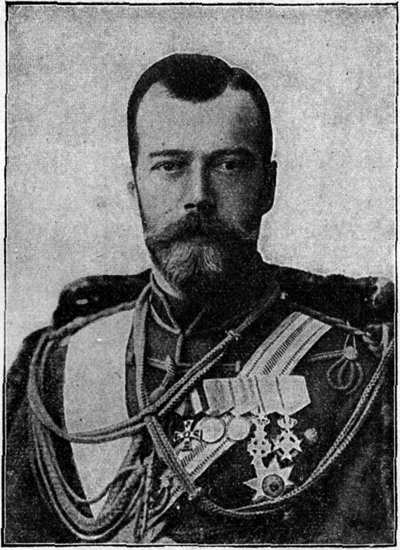
born on May 18, 1868, 12:02 PM
Accession to power on November 1, 1894.
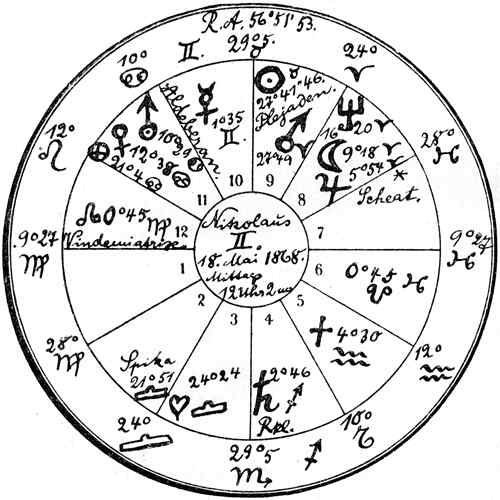
Before I begin explaining the horoscope of the much-ridiculed Russian emperor shown here, I would like to assert that I cannot conduct the judgment of his character from a hostile perspective because this nativity, in which nearly all of the influential bodies are above the Earth, is so suited to give a much more positive picture of the Russian Tsar than most of the newspaper articles soaked with partisanship, prejudice, and blind spitefulness. We are used to seeing only grotesque distortions, vile and tasteless caricatures of the so-called “little daddy”[4] in all sorts of satirical magazines, and let ourselves be served up all kinds of fairy tales and blatant lies.
As a result, it was twice as interesting and valuable to me to consider the horoscope of the Tsar as a weak-willed, characterless, and very limited person, however—but just the opposite is the case.
That is why I will provide the astrological rules word-for-word that relate to the exact mathematical calculation of the celestial configurations during his birth so that you can form a more accurate picture of the Tsar than has been previously possible. According to the contradictory newspaper reports, the Tsar has been presented to us either as a great mystic and dreamer, as a listless weakling, or as a cruel “blood Tsar.”[5]
Anyone who has a bit of physiognomic knowledge will already be able to tell from the—unaltered—portrait, that the Tsar himself cannot possibly be as “bloodthirsty” and “gruesome” and can easily understand that he probably only got a bad reputation due to the brutal conduct of several Russian grand dukes.
The essence of his nature is more peaceable, and according to his personal disposition, he would certainly be a lot happier if he had not ascended to the ruling throne of the vast Russian Empire, if fate had given him another role, in which he could live out more of his dreamy and philosophical inclinations.
The insight into his nativity may now provide a true reflection of his light and dark sides: for—if everything lies and deceives—the stars do not lie! In considering this nativity let us forget that the Russian Tsar is currently Germany’s enemy and only judge from the astrological and pure human point of view—as if we had someone else before us, born under the same sign.
As Nicholas II saw the light of the world, the sign Virgo was rising in the east, and according to its influence, he is by nature very methodical, orderly, generous, and concerned about the affairs of those who are close to him in love or friendship. Yet according to the information in the Astrological Library, Volume 2, page 80, he also has “the weakness of mixing himself up in the love affairs and friendships of others, and also causing disagreement in other alliances of a private nature.”
Everyone subject to the sign of Virgo possesses these qualities, some more, others less.
The political significance of the Tsar, however, is simply weak.
Another astrological theorem says: Those born under the sign of Virgo are always highly gifted, prone to reflection and diligent study, love reading and gathering a lot of positive knowledge.
So according to his rising sign, the Tsar is certainly not “dim” or “a dummy.” His high, clear forehead contradicts this.
The sign Virgo also represents the mentally agile form and gives a fairly adaptable nature. According to the entries in the Astrological Library those born under the sign of Virgo are usually modest, calm, and withdrawn, but always friendly and sympathetic. They like to analyze and criticize and are inclined to view everything from an intellectual and mental point of view, are inventive and extremely helpful people. They also possess a philosophical spirit and astute discernment. They also have a great love of money and are still attached to a materialistic way of life, even though it is not difficult to bring them to an occult worldview, which they will be very taken by at some point.
Friedrich Feerhow emphasizes in his course on practical astrology, page 68: According to Flambert’s “Statistique des acendants d’esprits supérieurs” a great number of creative spirits, who excel in philosophy, art or science, fall on the beginning and last degrees of the sign Virgo. To what extent this applies to the intellectual qualities and spheres of interest of the Tsar evades our observation, of course, however according to his natural disposition, he certainly has more appreciation for literature and art than for politics.
The ruler of the sign Virgo is Mercury, which was in Gemini during the birth of the Tsar, which also suggests high intellectual abilities and creative ideas. Volume 2, page 4, states the astrological rule about it: “The mental disposition will always be good if Mercury is in the sign of Gemini, Virgo, Libra, or Aquarius.
The good intellectual qualities are joined by cleverness, cunning, suspicion, caution, and sophistication because Mercury received an opposition from Saturn during the birth of the Tsar.
At times this configuration causes a lot of exasperation, grief, agitation through older people or relatives, as well as misfortune and failures during his reign, because Mercury in the 10th house, which refers to profession, office, or dignities, is affected by the bad aspect from Saturn.
Saturn (retrograde) in the 4th house points to great misfortune and enormous catastrophes in his parental home and may refer to the unlucky fate of his ancestors. However, through this configuration of Saturn, which is simultaneously the ruler of the 5th house of his nativity—which is under Capricorn—the Tsar himself and his family are also threatened with a lot of grief and massive suffering, especially at the end of their lives.
In the first part, I already mentioned that the 4th house of a horoscope provides information about the parents, about the parental home as well as about the circumstances the native will be in at the end of their life. A malefic planet in this house always points to an unlucky fate, whether we have before us the horoscope of a Tsar or some other person. The chain of suffering tragic fates extends further to his progeny because the sensitive point for sickness and death is in the 5th house of his nativity, which severely threatens the health and life of his children.
Saturn in opposition to the Sun likewise points to his father’s cruel fate.
In this nativity, the south lunar node (or Cauda Draconis) in the 6th house stands out, which suggests disloyal and recalcitrant subordinates (Vol. 2, page 151.) The Tsar will often be lied to and betrayed by his counselors or servants and is always surrounded by dishonest people. He himself will not have much to say.
The north lunar node in the 12th house points to many hidden enemies, temporary adversities, and great losses.
The planet Jupiter (as ruler of the 7th house) in the 8th in the sign of Aries occasionally brings him a lot of luck and honor through prominent people. Furthermore, this configuration of Jupiter in trine with Saturn indicates great inheritances, a lot of wealth as well as—in conjunction with the Moon—money through marriage.
The Moon in conjunction with Jupiter in the 8th house points to a good, benevolent, and peace-loving spouse, even if the marriage is otherwise drab, because the sign of Pisces rules the 7th house.
On the one hand, the Moon is in a good conjunction with Jupiter, on the other it forms a square aspect to Uranus and Venus in the 11th house, which indicates a lot of commotion, unrest, and sudden separations of relatives or friends. Through this aspect: Moon square Uranus there exists a danger of physical accidents and upsets through defamation and hostilities.
In reviewing, I noticed that in the horoscope of the Grand Duke Nikolaevich[6] Saturn is at 14° Cancer, that is, precisely on the position where Uranus exercised its influence during the birth of the Tsar. The people who have these two planets Saturn and Uranus at the same point are bound together somehow through a karmic fate. According to this configuration of Saturn, Grand Duke Nikolaevich exercises an uncanny influence over the more moderate and spirited Tsar, so that Nicholas II cannot act the way he would like to. He will breathe freely again, when this bond is finally broken, when the Grand Duke disappears from the screen or closes his eyes someday.[7]
In autumn of this year, Saturn and Mars will conjoin at this critical point in Cancer, so that both the Tsar as well as the Grand Duke will be affected by upsetting disagreement or a special event.
In the horoscope of the Tsar, Saturn’s transit over the natal position of Uranus in the 11th house can cause the sudden death of old friends or relatives or some other major failures; while in the horoscope of the Grand Duke, the transit over the natal position of Saturn will have a very disastrous effect for him personally. Unfortunately, I do not know the birth hour of the Grand Duke Nicholas Nikolaevich, so that it cannot be determined in which house of his nativity the unfortunate conjunction will occur.
In and of itself, Saturn in the zodiac sign Cancer in bad aspect to Mars causes chest and stomach pains, ulcerations and mucous of the lungs, fever, scurvy or breast cancer, tumors on the thighs or hips, and accidents. At any rate, through these double transits of Mars and Saturn the health and life of the Grand Duke will be under extreme threat.
In the natal chart of the Tsar Mars in the 9th house causes love of disputing, impulsivity, and impatience, but also a lot of hassles with relatives related through marriage. The Sun in the 9th house is good for the Tsar and hints at a good talent for divination—near the cusp of the 10th house in the midheaven, it indicates a high rise in life, honors, and distinction. Nicholas II could not reach a higher rank than being the Russian Tsar, only this rise is greatly clouded by the opposition from Saturn and is associated with a lot of grief.
The Sun in conjunction with the Pleiades has according to the information in the Astrological Library Vol. 2 page 157 also a very evil effect. This constellation often brings violent death by blows, stabbing or a killer, violent fates, and accidents.
However, the position of Jupiter in the 8th house is softening and protective, so that many attempted assassinations can still fail and many a serious danger is delayed.
The position of Neptune in the 8th house indicates a difficult or enigmatic death, which—because Neptune was in Aries—can also take place in an unconscious state because Aries rules the head.
If the Tsar can get beyond some very critical times in the next three years and reach an advanced age, then he is in danger of losing his sight one day.
People who have the luminaries, Sun or Moon, in conjunction with the Pleiades when they were born are usually predisposed to develop cataracts, which is not so bad these days because medical expertise has advanced so far and the operations usually succeed magnificently.
The position of Uranus in conjunction with Venus in the 11th house indicates that the influential friends of the Tsar are malicious and disloyal towards him and that he will be greatly disappointed by them.
Venus squaring the Moon also causes a lot of agitation due to women or female relatives and damage through indiscretions.
The sensitive point for fortune in the 11th house of the nativity points to many happy things in his life and to fortune through unexpected strokes of luck. At any rate, the wealth of the Tsar leaves nothing to be desired.
An overall view of the nativity of Nicholas II thus reveals that he is a well-natured man with excellent mental faculties, but that he has been allocated a very difficult role in life, in which—despite his affluence and external efforts—he certainly does not feel happy.
Thus, the Tsar may act carefully and diplomatically and—due to the evil celestial influences of Saturn and Mercury—let himself be persuaded by older relatives, especially from the demonic Grand Duke Nikolaevich, the instigator of disaster, however he[8] certainly cannot be blamed personally for the war.
Addendum
Since writing the preceding article, which like the others was taken verbatim from my Sternblatt pamphlet (No. 4) from the 2nd quarter of 1915, a good half-year has elapsed. Consequently, some of the transits indicated there, that is, the passage of planets over the positions influenced by evil celestial bodies during the births of the Tsar and his Grand Duke, have already had powerful effects.
In particular, the conjunction of Saturn and Mars mentioned on page 50, which took place exactly on September 11th of this year, led to disruptive scenes in Russia, which resulted in the banishment of the Grand Duke and major changes. The various daily reports in mid-September read:
Nikolaevich Ousting. Discharged and shunted!
According to a WTB Telegram from St. Petersburg, when assuming the supreme command, the Tsar appointed the former supreme commander Grand Duke Nicholas Nikolaevich as Viceroy of the Caucasus and the Commander-in-Chief of the Russian Caucasus Army.
The Banishment of the Grand Duke.
Berlin, September 19. According to a private message to the Morgenpost, a rumor is circulating in Petersburg court circles, that the Grand Duke Nicholas Nikolaevich is not allowed to leave Tiflis until further notice. It is a matter of a proper banishment.
Of course, outsiders cannot determine which serious conflicts, disputes, inner clashes, emotional shocks and commotion of this catastrophe may have taken place in the narrow circles around the Tsar and Grand Duke.
But this much will certainly be clear to every reader, that an ominous effect—already predicted in May of this year—of the critical conjunction literally arrived at the appointed time, that the conjunction of Saturn and Mars, which took place at 14° Cancer, did not fall short of its critical effect on the Grand Duke and Tsar.
Even the health of the Grand Duke left much to be desired at the time.
Individual papers even brought the under the headline: “The Assassination of the Grand Duke” (?) the most terrible rumors, which are not fully confirmed, nevertheless they provide proof of the miserable conditions of the Russian empire and how much people are already out to kill the much-hated Grand Duke.
Perhaps for this reason a relocation to a more remote region was also necessary.
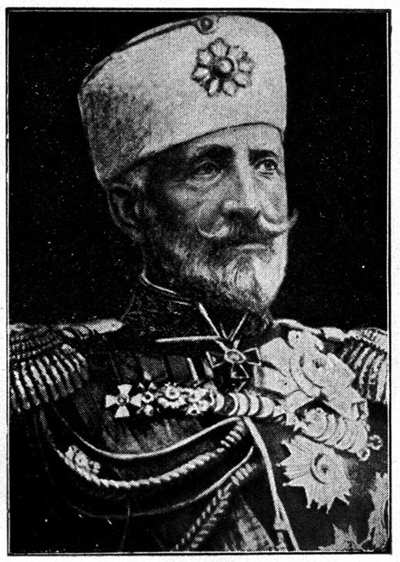
The whole incident may once again serve as proof that despite not knowing the birth hour of the Grand Duke, it was possible to foresee a critical period well in advance by regarding the positions of his main planets.
Likewise, the major decisive battles, indicated in February of this year in issue 2,[9] have meanwhile happened and the entire war situation has tipped to Russia’s disadvantage. The other events will come true over time.
Endnotes
[1] Her “Star Leaf[lette],” referring to the out-of-print pamphlets that she gathered into this book.
[2] Of her Sternblätter.
[3] The word here is: schadenfroh
[4] Väterchen
[5] Blutzar
[6] Born 18 November 1856 – d. 5 January 1929.
[7] Is “closing his eyes” a suggestion of death?
[8] This “he” refers to Nicholas II and not the Grand Duke.
[9] of her Sternblatt.
Source
Excerpt from Royal Nativities: Astrological Studies by Elsbeth Ebertin
© 2024 Jennifer Zahrt
First published in 2024
Translated from the original German:
Elsbeth Ebertin, Königliche Nativitäten: Astrologische Studien
Zur Einführung in die Wissenschaft der Sterne Bd. 1.
Wodan-Verlag Leipzig-Gohlis 1915
Elsbeth Ebertin
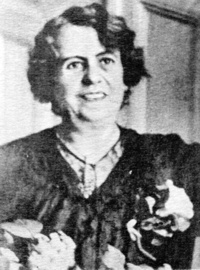
Elsbeth Ebertin was an astrologer, graphic artist, and prolific author who sometimes used Elsa Gorlizia as her pen name. She was the mother of famed astrologer Rheinhold Ebertin (pioneer of astrological midpoints) and was an excellent astrologer in her own right.
Jennifer Zahrt, PhD

Jennifer Zahrt holds a PhD in the cultural history of astrology in Germany from UC Berkeley (2012) and an MACAA from the Sophia Centre at the University of Wales Trinity Saint David (2015). She’s the President of the International Society for Astrological Research (ISAR), a Board Trustee of Kepler College, a company director of Sophia Centre Press, and in 2021, she founded the Celestial Arts Education Library in Washington State. Her latest book Dialectique des étoiles Walter Benjamin et l’astrologie appeared in 2025 from Éditions Vues de l’esprit.

